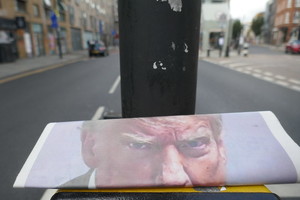UAW Strike Sparks Solidarity With Workers, Revives Recession Fears

Last Friday, the United Auto Workers (UAW) union initiated a limited-scope strike at plants owned by Ford, Stellantis NV, and General Motors.
Details: Currently, workers are striking at a GM plant in Missouri, a Stellantis plant in Ohio, and a Ford plant in Michigan.
"The money is there, the cause is righteous, the world is watching," said UAW President Shawn Fain.
Roughly 12,900 workers are striking, accounting for 9% of UAW members at the three companies. It's the first time in the union's 80-year history that it has struck the "Big Three" Detroit automakers simultaneously.
The UAW's key demands include a roughly 40% pay increase, the reinstatement of cost-of-living-adjustments lost during the 2008 financial crisis, the elimination of tiered wage systems, and job security provisions pertaining to the industry's transition to electric cars.
Fain said if "serious progress" is not made by noon on Friday, "more locals will be called on to Stand Up and join the strike." Both GM and Stellantis have announced layoffs in response to the strike.
How The Media Covered It: The stakes, implications, and motivations surrounding the strike are being hotly debated.
Left-rated voices offered more vocal support for the UAW and the striking workers, while right-rated voices expressed more skepticism.
Voices across the spectrum showed divides on key factors that led to the strike. Right-rated voices, such as the Wall Street Journal Editorial Board (Lean Right bias), blamed discord and disruption in the auto industry on President Biden's policies pushing automakers to increase electric vehicle production. Some auto workers feel these policies came at the expense of workers, fraying Biden's self-described reputation as the "most pro-union president in American history."
The left tended to frame the strike as a long-overdue response from workers, who, according to a writer in MSNBC (Left bias), are "rightly furious that their pay has remained stagnant for decades as executives and investors reaped the gains of their increasing productivity."
Voices across the spectrum addressed concerns over the strike's economic impact to varying degrees. Some left-rated voices noted the strike's limited scope and the American auto industry's general decline as reasons to believe the stoppages won't send the economy into a recession. Some right- and center-rated voices highlighted the UAW's threats to expand the strike as a reason to fear potentially deeper economic impacts.
More from AllSides
Snippets from the Right
A UAW Strike Made in Washington
Wall Street Journal Editorial Board (opinion)
"In many ways, this strike is made in Washington because of the Biden Administration’s policy mandating a rapid transition to electric vehicles. The UAW knows that EVs require fewer workers to make and will jeopardize union jobs making gas-powered cars. But the companies already lose money on EVs and worry about making too many concessions to the UAW that will cause them to lose even more as they are forced to build more EVs."
UAW strike: What the media won't tell you about the strike
Washington Examiner (opinion)
"It has been a rough decade for the UAW. The union’s two previous presidents exited as a result of corruption scandals. Fain only narrowly won his election to the top slot. The UAW isn’t fighting the political push for electric vehicles, even though that is certain to cost some members their jobs. The union’s efforts to organize factories in the South haven’t been successful. At least the union can still count on most of the media to reflect its spin."
Snippets from the Center
How UAW Strike Could Push America to 4-Day Workweek
Newsweek
"As part of the work-life balance request, the union is trying to negotiate a 32-workweek for 40 hours of pay that union President Shawn Fain said goes back to the 1940s... The debate over four-day workweeks has gained significant traction over the last few years around the world as workers push for more flexibility in their jobs. In the U.S., about 20 percent of companies surveyed by the International Foundation of Employee Benefit Plans are either considering, piloted, have formally implemented or have instituted four-day workweeks."
‘We’re in the abyss’: How the UAW strike could hit the economy
The Hill
"While the current economic impact of a targeted strike by the United Auto Workers (UAW) is limited, the threat of a full walkout looms over contract negotiations with auto giants Ford, General Motors and Stellantis. Right now, that threat is hard to quantify — any estimate will depend on the length of the strike and how many more workers are called to the picket line. Even so, the economic impact of a full-fledged 10-day strike against the Big Three could top $5 billion, the Anderson Economic Group estimated in an August report."
Snippets from the Left
Why the UAW strike is bigger than the auto industry
MSNBC (opinion)
"This is set against a longer-term backdrop of rising economic inequality. Generations of workers are rightly furious that their pay has remained stagnant for decades as executives and investors reaped the gains of their increasing productivity. Autoworkers have been exposed to the full force of these trends. They and their unions made grand concessions after the 2008 financial crisis to save their industry. When the companies’ fortunes improved, they forgot the workers’ sacrifice."
The Economic Stakes of the UAW Strike
The Atlantic (opinion)
"Carmaking looms large in the American psyche: Americans tend to think of the auto industry as powerful. But the industry is much smaller than it once was, and much less unionized. In the heyday of American car manufacturing after the Second World War, Katz noted, 95 percent of workers in the independent auto-parts sector were in unions. Now that figure is closer to 5 percent. As the size and heft of the auto industry have declined, so, too, has the power of a strike to affect America’s economy."

April 26th, 2024

April 25th, 2024

April 25th, 2024